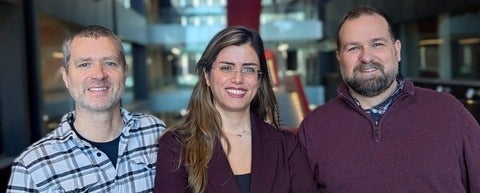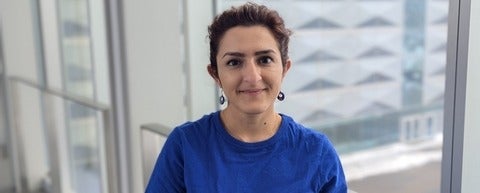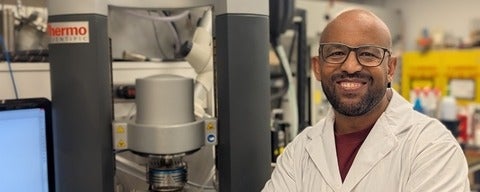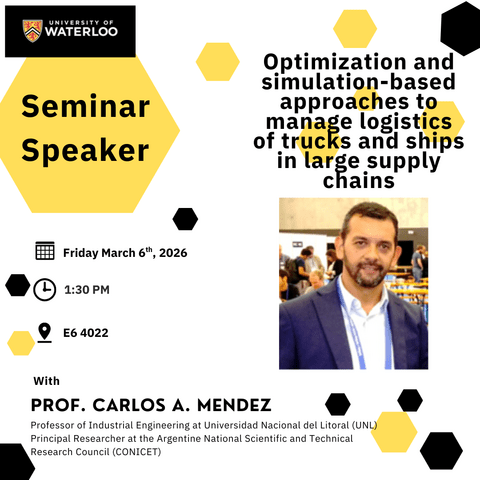Welcome to Chemical Engineering at the University of Waterloo
The department's small class-sizes, engaging teaching practices, and hands-on learning in our state-of-the-art facilities empower our students to solve real-world problems.
The Department of Chemical Engineering is a vibrant center of collaborative research addressing some of the most pressing challenges in energy and materials. Our faculty members are engaged in a diverse array of research in areas such as machine learning and process systems engineering, CO2 capture and conversion, polymer engineering, renewable energy, synthetic biology, environmental remediation, and materials science that push the boundaries of innovation.

Find out more by exploring the programs, research and news stories on this site.
News
Bacteria poised to battle cancer
Researchers at the University of Waterloo and industrial partner Center for Research on Environmental Microbiology (CREM Co Labs) have advanced research that uses bacteria to target cancer. The research group leveraged synthetic biology to prompt bacteria to “eat” tumors from the inside out to treat cancer.
The idea began as PhD student Bahram Zargar’s dream to create a therapy that could attack cancer tumors from the inside. He studied under the supervision of Professors Brian Ingalls and Pu Chen.
The center of a cancer tumor is made of dead cells with no oxygen present. Clostridium sporogenes is a bacterium that can only grow in the absence of oxygen. These bacteria can grow in the dead, oxygen-free center of tumors and “eat” them from the inside.
“C. sporogenes will form spores that will grow under "good" growth conditions. These conditions exist in the core of a solid tumour. The challenge is that these organisms die when they reach the outer part of the tumour where oxygen still exists and are unable to complete the job of getting rid of the tumor fully,” says Marc Aucoin a professor in the department of chemical engineering who has continued this work with Ingalls.
Pendar Mahmoudi wins two teaching excellence awards
The Department of Chemical Engineering is proud to announce that Professor Pendar Mahmoudi is the 2025 recipient of the Faculty Teaching Excellence Award and the Boyce Family Teaching Award.
"I feel truly honoured and humbled to win these awards. Getting rewarded for a job I enjoy is a blessing. I am extremely thankful for the support of my colleagues in the department, who will happily listen to new ideas or issues and offer assistance or advice," says Mahmoudi.
The Faculty Teaching Excellence Award is adjudicated by program chairs and directors, whereas the Boyce Family Teaching Award is a student-driven award.
Although judged by very different groups, they both reached the same conclusion that Mahmoudi’s teaching methods successfully incorporate experiential learning, innovative teaching and commitment to student connection and success.
Mahmoudi began teaching in 2018 after finishing her PhD at the University of Waterloo. It was during her graduate studies that she discovered her passion for teaching.
A greener future for personal hygiene products
A chemical engineering research group led by Professor Tizazu Mekonnen has developed an eco-friendly super absorbent hydrogel that could dramatically reduce the environmental impact of personal hygiene products like diapers, menstrual pads and tampons.
Unlike current products, which take centuries to break down, this new material degrades harmlessly in soil within three months.
In North America, billions of disposable diapers end up in landfills annually, according to the U.S. Environmental Protection Agency (EPA) taking up to 450 years to decompose.
Around 1.8 billion women menstruate monthly, and most single-use menstrual pads and tampons also end up in landfills. These products are about 90 per cent plastic and can take up to 500 years to break down, according to the United Nations Environment Programme.
Events
PhD Comprehensive/Pervaporation Separation of Heteroaromatic Organic Compounds from Coking Wastewater Using PEBA-2533 Membranes by Yixuan Wu
Pervaporation Separation of Heteroaromatic Organic Compounds from Coking Wastewater Using PEBA-2533 Membranes
Graduate Seminar| Optimization and simulation-based approaches to manage logistics of trucks and ships in large supply chains, by Prof. Carlos A. Mendez
The Chemical Engineering Department is hosting a special graduate lecture on Optimization and simulation-based approaches to manage logistics of trucks and ships in large supply chains.
PhD Comprehensive/Examine the biochemical and biomechanical effects of Descemet's membrane on human corneal endothelial cell responses in an in vitro model by Lexie Xi
Examine the biochemical and biomechanical effects of Descemet's membrane on human corneal endothelial cell responses in an in vitro model














